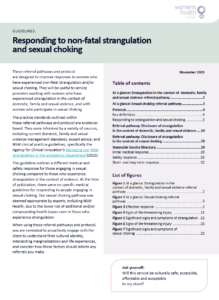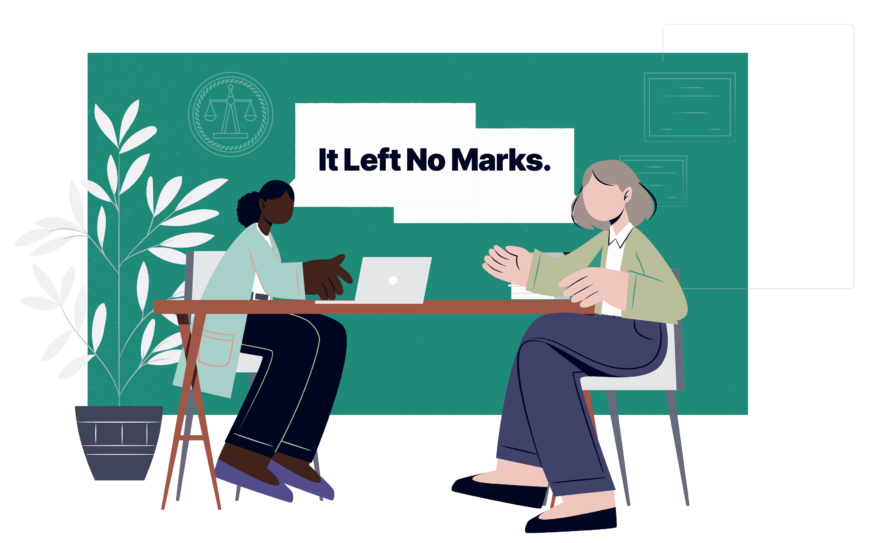
There should be a ‘no wrong door’ approach to women experiencing violence. This means that regardless of where a woman enters the service system, she is supported to access appropriate care that meets her holistic needs. For women disclosing experiences of non-fatal strangulation, including those who might be suffering from an acquired brain injury, this means all the services she encounters need to have appropriate referral pathways and protocols and staff who are supported by regular training to use them. The Pathways Project was designed to support and strengthen professional understanding and local capacity to respond to sexual assault related strangulation.
Women do not always disclose strangulation at the time it occurred or attend an emergency department directly after being strangled. Studies have shown that when women disclose other forms of physical intimate partner violence there is higher likelihood that they will have also experienced strangulation. The way we ask about strangulation is particularly important as victims and survivors can minimise the impact of strangulation or fail to relate their experiences to screening questions that use jargon or legal terminology. Services need to be cognisant of children’s needs, as research indicates they are often in the home when strangulation by an intimate partner occurs. When appropriate, services may also need the knowledge and skills to deliver effective health promotion to women who are engaging in sexual choking. Service providers working with women with experiences of violence should also be cognisant of vicarious trauma. Full Stop Australia provide Vicarious Trauma Management Training that may assist.
The evidence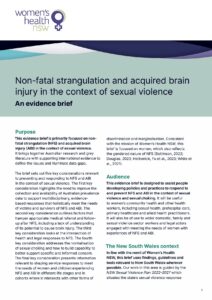
This Women’s Health NSW evidence brief brings together Australian research and grey literature with supporting international evidence to define the issues and illuminate data gaps relevant to preventing and responding to strangulation and brain injury in the context of sexual violence. It covers the intersection of health and legal responses to NFS and addresses the normalisation of sexual choking and how to build capability to better support specific and informed consent. You will also find information relevant to shaping service responses to meet the needs of women and children experiencing strangulation and brain injury in different life stages and in cohorts where it intersects with other forms of discrimination and marginalisation. Non-fatal strangulation and acquired brain injury in the context of sexual violence: An evidence brief
Medical referral letter
This medical referral letter is a peer-reviewed template that is able to be downloaded and customised to your service. It is designed to support women’s self-advocacy with general practitioners when seeking medical help following strangulation and possible brain injury. Medical referral for incidents of non-fatal strangulation and suspected brain injury
Building a referral pathway
The Guidelines: Responding to non-fatal strangulation and sexual choking have been designed to improve service responses to women with experiences of non-fatal strangulation and sexual choking in New South Wales via the creation of two referral pathways and a protocol. They were created by Women’s Health NSW to support our network of women’s health centres to develop their own organisational protocol and referral pathways for responding to women who have experienced non-fatal strangulation and sexual choking.
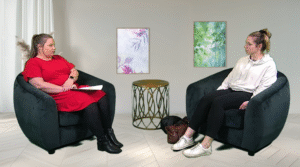 Some women’s health centres supplemented their organisational protocol and referral pathways with an assessment tool. We created a generic assessment tool for external services by aggregating the various tools created by the women’s health centres we worked with: Assessment Tool: Responding to strangulation in the context of domestic, family and sexual violence. Support staff to conduct strangulation assessments in a conversational, relational and client-focused way by sharing or embedding this recorded demonstration of a strangulation assessment in your onboarding or induction manual: Strangulation Assessment: A recorded demonstration.
Some women’s health centres supplemented their organisational protocol and referral pathways with an assessment tool. We created a generic assessment tool for external services by aggregating the various tools created by the women’s health centres we worked with: Assessment Tool: Responding to strangulation in the context of domestic, family and sexual violence. Support staff to conduct strangulation assessments in a conversational, relational and client-focused way by sharing or embedding this recorded demonstration of a strangulation assessment in your onboarding or induction manual: Strangulation Assessment: A recorded demonstration.
Connecting with General Practitioners (GPs)
If you are reaching out to doctors and other healthcare providers to build a referral pathway for your service, we have two resources that might be useful. The first is a wallet card to connect GPs to the information on the Healthcare Providers page of It Left No Marks. Download it here: Wallet card for GPs. The second resource is a short video that talks to GPs about their role assisting women with experiences of strangulation, that you will find here: It Left No Marks for General Practitioners
Health promotion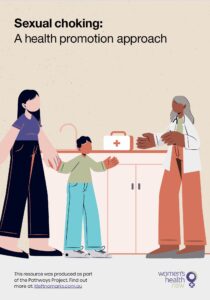
Service providers can play a role in delivering health promotion to women who have been strangled or who are engaging in sexual choking. This can be done personally, by familiarising yourself with key messages about sexual choking, and through the sharing of resources, like this podcast about sexual choking, or this Women’s Health NSW video about strangulation. We have also created a series of print-ready promotional resources designed to connect women to this Women’s Health NSW website and the information it contains for women about strangulation and sexual choking. You can download and print It Left No Marks posters, postcards and wallet cards here: It Left No Marks postcard, poster and wallet card
Working with men
If you are a service provider who works with men, we have created this video showing how you might devise health promotion messages suitable for men who use power and control in their relationships.
It Left No Marks brochure for women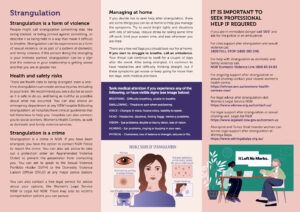
This trifold It Left No Marks brochure for women is designed to be a conversation starter on strangulation and sexual choking. With a box to add your own service details, it’s a great one to print for your service’s brochure stand to show women these are issues your staff are ready and waiting to discuss: It Left No Marks brochure for women
Case notes and record keeping
Developed in conjunction with Women’s Legal Service NSW, this 2024 Ask Lois webinar provides information about how to ensure case notes and record keeping can best support women who opt to pursue legal or compensatory outcomes following strangulation: Ask Lois webinar on strangulation. Women’s Legal Service NSW have also produced a separate webinar on subpoenas and record keeping that you can access here: Ask Lois webinar on subpoenas and case notes
Further training
Women’s Health NSW have created a 45-minutes recorded training designed to  improve service provider confidence in responding to women who have experienced strangulation, sexual choking, and who may be suffering from an acquired brain injury. https://www.itleftnomarks.com.au/resources/workforce-training-strangulation-sexual-choking-and-acquired-brain-injury/
improve service provider confidence in responding to women who have experienced strangulation, sexual choking, and who may be suffering from an acquired brain injury. https://www.itleftnomarks.com.au/resources/workforce-training-strangulation-sexual-choking-and-acquired-brain-injury/
Insight Exchange offer a free 60-minute online learning module for service providers in Australia, New Zealand and Canada called Building understanding of and responses to strangulation. The video, which only covers strangulation not sexual choking, includes AUSLAN sign language. There is a time-limited opportunity to supplement this online module with a free session for your whole team where, across a 90-minute session, staff watch the module then take part in a live question and answer session with a facilitator. https://www.insightexchange.net/strangulation/
Further reading and viewing
Professor Heather Douglas, University of Melbourne (2023): The Australian legal response to non-fatal strangulation: Policy recommendations https://www.emerald.com/insight/content/doi/10.1108/EOR-13-2023-0025/full/html
Legal Aid NSW (2021): Strangulation or Suffocation https://publications.legalaid.nsw.gov.au/PublicationsResourcesService/PublicationImprints/Files/924.pdf
Scotia Mullin (2025): The characteristics and circumstances of fatal interpersonal strangulation in Australian adults https://journals.sagepub.com/doi/10.1177/08862605251321001
Professor Heather Douglas, University of Melbourne (2024): Prevalence of Sexual Strangulation/Choking Among Australian 18–35 Year-Olds https://doi.org/10.1007/s10508-024-02937-y
Professor Heather Douglas, University of Melbourne (2025): Choking/Strangulation During Sex: Understanding and Negotiating “Safety” Among 18-35 Year Old Australians https://link.springer.com/article/10.1007/s10508-025-03097-3
Dr Samantha Keene, Victoria University of Wellington (2021): Pornography, rough sex, and choking: Insights and challenges [WEBINAR] https://youtu.be/pKgBOFUPVLY?si=gF8Mblh15kMPaPVX
Giselle Woodley, Edith Cowan University (2024): Minimising the Risk: Teen Perspectives on Sexual Choking in Pornography https://journal.media-culture.org.au/index.php/mcjournal/article/view/3088
Blue Butterfly Institute (2024): Breathless: Navigating the risks and realities of erotic strangulation [PODCAST] https://open.spotify.com/episode/5Ke9RGjosHvjHUqf6brKhD
Red Rose Foundation (2023): Brain injury [WEBINAR] https://www.youtube.com/watch?v=9y75_ReDvDg
Dr Michelle Fitts, Western Sydney University (2022): Understanding the lives of Aboriginal and Torres Strait Islander women who have experienced a traumatic brain injury through family violence https://westernsydney.edu.au/ics/projects/understanding_the_lives_of_aboriginal_and_torres_strait_islander_women_who_have_acquired_a_head_injury_related_through_family_violence
Victorian Institute of Forensic Medicine (2022): It’s Never OK [VIDEO]: https://www.vifm.org/non-fatal-strangulation/
